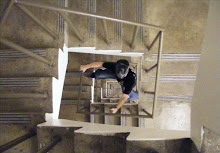*Note: This is a response to a philosophy class discussion on Descartes.
Descartes says, "the decay of the body does not imply the destruction of the mind," implying that the mind and body are two distinct entities, and claims they are separate, and even opposite of one another. This is further supported by the idea that as long as one possesses thought, one exists, regardless of whether the physical body that we know exists or not. But what about alzheimer's? The decay of the brain, which is a physical aspect of the perceived body, leads to a decay of the mind, a discrepancy of thought. An old man who once was capable of great things now is limited by the decay of his body; his thoughts are hedged in. He is no longer able to function as he was once able.
Take the case of Charles Whitman, the Texas Tower Sniper of August 1, 1966, as another example of mind decay. He was responsible for the death of 14 individuals, and for 31 wounded. He was diagnosed with a tumor in his brain, which caused irrational and violent thoughts, leading to the heinous actions. It was because of a physical problem that his mind was warped.
So what does this imply for the thought of an afterlife, if the mind is so strongly affected by the physical body? Descartes talks of wax, and how easily the senses are fooled by it. But what if the body is much like a wax figure? Ever changing, ever being reshaped. Experiences of a lifetime change the way we think, the way thoughts are perceived or processed in the mind, so thus mind is changed as well. Which seems to make sense, for the mind is surely different from when we are children to when we are adults. And even if all the experiences that happened are false, that does not change the fact that physical experiences changed the mind in some way. So the body and mind and both malleable, both wax figures, changing from one state to another. Is the death of the body merely another change of state? Does that mean that the mind changes state as well? Or does it die with the brain, tied so tightly to the physical changes the brain goes through. However, no matter the change of state in the wax, it is still wax, it still remains. No one can deny that the body still exists after death, so then would the mind not also remain?
Thursday, March 4, 2010
Subscribe to:
Post Comments (Atom)








No comments:
Post a Comment